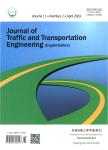A methodology for calibration of traffic micro-simulator for urban heterogeneous traffic operations
A methodology for calibration of traffic micro-simulator for urban heterogeneous traffic operations作者机构:ARCADISBengaluru 560017India Department of Civil EngineeringIndian Institute of Technology KharagpurKharagpur 721302India Department of Civil and Environmental EngineeringTechnische Universitat DarmstadtDarmstadt 64287Germany
出 版 物:《Journal of Traffic and Transportation Engineering(English Edition)》 (交通运输工程学报(英文版))
年 卷 期:2020年第7卷第4期
页 面:507-519页
核心收录:
学科分类:1201[管理学-管理科学与工程(可授管理学、工学学位)] 08[工学] 082303[工学-交通运输规划与管理] 0813[工学-建筑学] 0814[工学-土木工程] 082302[工学-交通信息工程及控制] 0823[工学-交通运输工程]
基 金:the German Academic Exchange Service and Science and Engineering Research Board
主 题:Traffic operation Micro-simulation Heterogeneous traffic Vehicle-class Driver behavior VISSIM
摘 要:Traffic micro-simulation is a widely accepted tool in many countries for the evaluation and assessment of alternative design ***,for several developing countries,replicating heterogeneous,non-lane based traffic in a micro-simulation framework is gaining increased importance and still remains a challenge due to its *** present study demonstrates a methodology to calibrate a traffic micro-simulation model giving due consideration to vehicle-class specific driver behavior in an urban Indian scenario for a midblock section and an intersection approach in *** sensitive parameters affecting the driver behavior were identified for every vehicle type using Latin Hyper cube design,taking vehicle class specific travel time as a performance *** regression models were developed for each vehicle class considering the sensitive driving behavior *** models highlight that the dependency of measure of effectiveness(MOE)of one vehicle type is not only limited to its own driver behavior but also on parameters of other vehicle classes.A genetic algorithm based optimization was adopted to obtain optimal parameter sets for different vehicle *** optimum values were found to vary significantly across all vehicle classes at a 95%confidence *** and multi-criteria calibration principles are also implemented to yield much more realistic results and subsequently minimizing weighted error for all vehicle classes.



